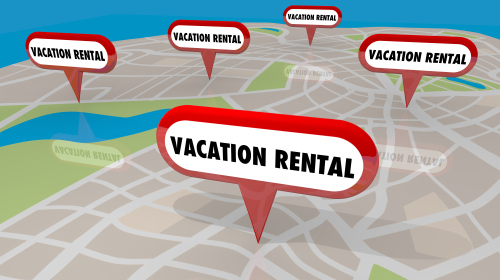
It may come as a surprise to investors but owning and managing vacation rentals is not the same as traditional real estate. That said, the rapidly expanding short-term rental industry continues to provide opportunities for new and seasoned investors alike. However, to be successful, a keen eye for the right location is vital. Additionally, owning a vacation rental requires accepting and planning that there will be some vacancy. So, join us below as we examine the pros and cons of investing in vacation rentals and essential tips to be profitable.
Are Vacation Rentals a Good Investment?
Deciding to add vacation rentals to your portfolio is not a decision to take lightly. After all, this is one of the fastest-growing, and therefore competitive, investment sectors. Along with tax benefits and added income, you too can plan time to vacation there! That said, carefully weighing the pros and cons of this type of real estate will help ensure you make the right decision for your investment goals. Let’s review some benefits and possible drawbacks of vacation rentals below.
What are the Pros of Owning a Vacation Rental?
- Tax Advantages – Depending on how you look at it, taxes are both a pro and con. While you will pay added income tax, investing in vacation rentals also has tax benefits. For example, possible deductions may include interest, property taxes, and professional management fees. Additionally, other business expenses like housekeeping and supplies provide added tax breaks. That said, save every receipt and speak with a qualified tax professional to get the most benefit you can.
- Additional Source of Income – One of the most obvious benefits to investing in vacation rentals is added income. That said, the amount of earning potential varies based on many factors. However, surveys from popular site HomeAway (now branded as VRBO) indicate the average rental brings in $11,000 to $33,000 per year. So, for owners in high-demand locations that put effort into ensuring quality marketing, the earning potential is quite lucrative.
- Helpful Technology – A booming industry means technology is available to aid owners in many key aspects of building a vacation rental business. Popular platforms like Airbnb and VRBO allow owners to conveniently list, market, manage, and grow their rental listings in an easy-to-use app.
- Built-in Vacation – Investing in vacation rentals also means you could have a vacation home for your own use. Whenever possible, invest in an area you are familiar with and enjoy. Ideally, choosing a popular vacation spot or somewhere you would consider retiring could save money in the long run.
- Long-term Value – Over time, the vacation home or homes you purchase may grow in value. This contributes to a better resale value, especially in high-demand areas.
The Cons of Investing in Vacation Rental
- Local Restrictions – Due to the transient nature of vacation rentals, some HOAs and jurisdictions are fighting back. Always review local laws and any restrictions on short-term rentals before purchasing in a particular area.
- Added Wear and Tear – Investing in vacation rentals, like traditional real estate, requires maintenance and upkeep. However, the revolving door of a short-term rental creates greater wear and tear and potentially higher maintenance costs to prepare for.
- Expenses – Expenses for any rental property can add up. That said, vacation rentals have added expenses that long-term rentals do not. For example, this type of rental must be fully furnished. Furthermore, the owner is responsible for ensuring the home is cleaned and restocked of basic supplies between each guest. Plus, there are management costs, booking fees, and typically higher down payments to initially purchase.
- Higher Potential for Vacancy – Marketing is crucial to the success of any rental investment, but especially vacation rentals. That said, short-term rentals are more susceptible to seasonal high or low demand. Therefore, owners must plan for and find ways to combat this potential for a seasonal vacancy.
- Less Control Over Occupants – For short-term rentals, owners cannot perform the extensive background and rental screening they normally would for long-term leases. While working with popular sites does afford some peace of mind in the form of verifying identity, in general, short-term owners know far less about the individuals renting their home.
7 Tips for Investing in Vacation Rentals
Once you decide that investing in vacation rentals might be a good choice, the journey is just beginning. In fact, purchasing this type of investment requires extra market analysis and considerations to make the best choice. Join us below as we break down our top tips for successful short-term rentals.
- Location, Location, Location
- In-Depth Due Diligence
- Anticipate the Ebb and Flow
- Estimate Expenses and Projected Income
- Marketing 101
- Curate an Experience
- Foster Repeat Business
Location, Location, Location
The competitive and booming vacation rental market means picking the right location is vital to success. In fact, choosing the right location goes beyond simply picking a city or destination. Within each locale, there are different neighborhoods that owners must also consider. Therefore, investing in vacation rentals requires owners to examine the following –
- Market Conditions – Are people flocking to this area?
- Weather – Does the destination offer year-round activity to draw tourists?
- Amenities – What locations offer the best proximity to amenities and attractions?
- Inventory – Is this a popular destination for short-term rentals?
- Property Type – What types of properties make up the majority of the market? (single-family, condos, etc.)
In-Depth Due Diligence
Once you narrow down a few suitable locations, it is time to look more in-depth into whether they are ideal for vacation rentals. Every location will experience vacation trends, and these will impact your success as a landlord. So, take time to research local competition thoroughly. Check popular websites to see other short-term listings in the area. In addition to looking at the rental rates, be sure to check their availability calendar. It is important to note that many established rental units will have far lower vacancy rates than someone just starting. Therefore, to paint a clear picture of market expectations, look at properties that are far down in the search results.
Anticipate the Ebb and Flow
More so than a traditional rental property, vacation rentals experience an ebb and flow to vacancy rates. Often, income potential depends on the season. Additionally, certain locations provide year-round enjoyment for tourists. Therefore, take a realistic look at the tourist potential in your target area. If, for example, you choose a seasonal beach town, landlords must be able to cover expenses during the slow season when rental income is down. All of these factors are important to determine the financial viability of the investment property.
Estimate Expenses and Projected Income
Crunching the numbers is a crucial task for investors. Using market comparable properties, landlords can estimate the projected nightly or weekly rate they could charge. This, along with estimating expenses and factoring in the vacancy rate, will offer projected profit potential. While the location will greatly affect the occupancy, experts agree investors should plan for at least a 25% vacancy rate. Additionally, the average rental rate per week should be at least 10% above the mortgage payment. However, in high-demand areas, owners could charge much more. Then, consider and estimate expenses such as maintenance, restocking, cleaning, HOA fees, and management fees.
Marketing 101
After purchasing your chosen property, it is time to aggressively market and fill up your calendar with bookings. Popular sites such as VRBO and Airbnb are convenient platforms that allow owners to list and organize bookings easily. While these sites are not free, they provide owners a multitude of advantages such as exposure, mobile-friendly listings, and secure booking transactions. That said, before you list your property, be sure you are ready to go with the following –

- Thoughtful Staging – A vacation home must provide all furniture, linens, etc. While personal touches are great, it is important to keep them to a minimum in a rental. Avoid family heirlooms, personal photographs, or clutter. Therefore, this keeps the space neutral and helps to eliminate special items getting damaged or stolen.
- Professional Photos – A photo is worth a thousand words, and it’s the photo that entices renters to click on your listing. So, invest in either a professional photographer or make the most of the DIY approach. Use a good camera and brighten the space as much as possible with natural and interior lighting. Bright spaces appear larger and more welcoming to the viewer. Also, do not forget to highlight outdoor spaces or special local features such as a community pool.
- Dynamic Descriptions – Once you have grabbed their attention with photos, a short but dynamic description is key. Highlight the home’s best features that will appeal to your target market. Furthermore, offer insight into the local area by letting renters know how far it is to amenities, local attractions, and entertainment.
In addition to popular sites that cater to vacation rentals, other outlets such as Facebook or Instagram are a great way to boost interest in your rental. So, take advantage of all digital outlets because more exposure means more bookings.
Curate an Experience
Individuals and families looking for a short-term vacation rental are in part doing so because they seek a different experience than what a traditional hotel provides. Therefore, providing extra comforts of home will help make an impression on guests and build potential repeat business. In addition to providing a clean and stylish space, consider offering a welcome basket to incoming guests. This could include any of the following and is a great way to make them feel special and thank them for choosing your rental –
- Assorted snacks
- Guides to local hotspots
- Coupons for local attractions
- Fresh flowers
- Bottled water
- Locally sourced soaps or bath products
- Fresh fruit
Foster Repeat Business
Investing in vacation rentals relies on many factors to produce profitable results. However, one of those important factors is guest satisfaction and online reviews. Obtaining great reviews helps to boost your listing and make future guests feel more confident in the booking. According to OptimizeMyBnB.com, around 70% of guests leave an online review. Therefore, just one bad review could significantly impact your overall rating. So, be available for any questions or concerns the guest may encounter during their stay. Additionally, reach out to them after checkout and once again thank them for their business. Then, invite them to post a positive review and share their experience.
5 Safeguards for Owners Investing in Vacation Rentals
Welcoming renters into your investment property on a short- or long-term basis inherently comes with some risk. While there is no way to avoid this completely, landlords can take steps to protect themselves. Continue reading for our top suggestions below –
- Inventory All Possessions – Before allowing renters into the home, take an inventory of all possessions, including linens, movies, electronics, and dishes. Once the guest departs, verify all items are accounted for.
- Check Guests Reviews – Some popular sites include access to landlord reviews of guest accounts. If so, check there before accepting a reservation request. You just may avoid a potentially bad tenant.
- Create a Guest Agreement – Creating a detailed rental agreement helps by protecting both parties in the event of a dispute. That said, always include check-in and check-out information, pricing and fees, cancellation requirements, and what happens if the unit is damaged. Furthermore, it is worth noting certain rules such as no parties or events, no smoking, no pets, or anything else you may want to cover.
- Damage Deposit – Requiring a refundable damage deposit is a great way to look out for your interests and encourage tenants to care for the unit. Additionally, some landlords require the guest to purchase damage insurance for a small fee.
- Create a Property Guide – Having a printed guide to your property and the local area is a great resource for guests. Include locations for items tenants may need, like additional towels or instructions and safety information for items such as a fireplace. Additionally, address special rules such as no pets, no smoking, or no noise after 10 pm. It is also not uncommon for vacation rentals to have a specific check-out procedure, such as collecting trash into one area.
How Property Management Can Maximize Rental Potential
Savvy investors know that professional management services offer more than just help with day-to-day operations. Specializing in long-term rentals, the Bay Property Management Group experts help maximize your investment’s potential by leveraging local market knowledge to get your listing noticed. From there, qualified leasing professionals guide tenants through a thorough screening and lease process. With a commitment to top-notch customer service, it is no surprise that BMG has become a leading source of experienced property managers in Bucks County and throughout the Philadelphia area. So, if you are deciding between investing in vacation rentals or pursuing a traditional portfolio, give us a call today to see how full-service property management can help!

